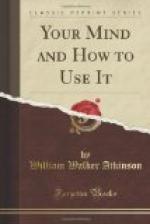READINGS AND EXERCISES
Readings:
Adams (1) Chapter IV.
Dearborn (2) Chapter V.
Dewey (3) Chapters III and VI.
Exercise I. Illustrate the steps of the reasoning process, by describing the way in which you studied this chapter.
Exercise 2. Try to define the following words without the assistance of a dictionary: College, university, grammatical, town-meeting.
Exercise 3. Prepare a set of maxims designed to help a student change from the “rote memory” method of study to the “reason-why” (or “problem”) method.
CHAPTER X
EXPRESSION AS AN AID IN STUDY
In our discussion of the nervous basis underlying study we observed that nerve pathways are affected not only by what enters over the sensory pathways, but also by what flows out over the motor pathways. As the nerve currents travel out from the motor centres in the brain to the muscles, they leave traces which modify future thoughts and actions. This being so, it is easy to see that what we give out is fully as important as what we take in; in other words, our expressions are just as important as our impressions. By expressions we mean the motor consequences of our thoughts, and in study they usually take the form of speech and writing of a kind to be specified later.
The far-reaching effects of motor expressions are too infrequently emphasized, but psychology forces us to give them prime consideration. We are first apprised of their importance when we study the nervous system, and find that every incoming sensory message pushes on and on until it finds a motor pathway over which it may travel and produce movement. This is inevitable. The very structure and arrangement of the neurones is such that we are obliged to make some movement in response to objects affecting our




